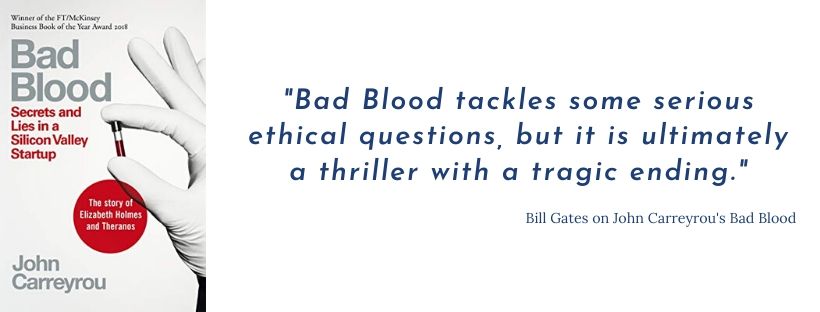Bad Blood: Secrets and Lies in a Silicon Valley Startup
18 Dec 2019

The story of Elizabeth Holmes’ rise and fall is almost Shakespearean in nature. The young entrepreneur, who started blood-testing company Theranos after dropping out from university, was undone by her own extreme ambition and myopic focus on success, just as so many of the bard’s characters were.
John Carreyrou’s propulsive tale of Holmes and Theranos, Bad Blood: Secrets and Lies in a Silicon Valley Startup, is genuinely hard to put down. Winner of the FT/McKinsey Business Book of the Year in 2018 and praised by Bill Gates and the New York Times amongst others, this is journalism at its best: comprehensive, well-researched, well written and nuanced, Bad Blood reads like an absorbing crime thriller. As the Daily Telegraph writes, “It is a parable, with all the usual delicious ingredients of human folly: greed, pride, vanity, lust, anger.”
Within the first pages it is evident that Holmes is a fascinating personality for a case study: she’s enigmatic, hard-working and wildly ambitious, and always appears in public in her trademark black turtleneck (à la Steve Jobs), captivating audiences with her commanding baritone voice and that rare ability to make whomever she was speaking to feel as if he or she were the “centre of the world”.
The reader very quickly gets an insight into her motivation for greatness with Carreyrou’s reportage on her family: there is a history of success on both sides but particularly on her father’s, and Elizabeth was groomed from a young age to follow the patrilineal lead. As she has said, she “grew up with these stories about greatness.” Her parents pushed her to achieve but also taught her what happened when you didn’t do something purposeful with your life, her father using his own father and grandfather, who supposedly wasted the family fortune, as cautionary tales.
The message was imbibed early on. As a seven-year-old girl, she is reported to have answered a question about what she wanted to be when she grew up with, definitively, “I want to be a billionaire.” As a college student, biotechnology seemed the best way to marry financial success with purpose, and so she dropped out of Stanford and pursued investors for her ambitious start-up.
The speed with which she got powerful, reputable, wealthy investors on board is remarkable and testament to her charm but also, disturbingly, to the ease with which she engaged in profound obfuscation. Not only did she propose extremely optimistic – perhaps unrealistic – revenue projections but she lied to investors about partnerships with pharmaceutical companies and, astonishingly, used manufactured results or results from previous run throughs when demonstrating how the blood pinpricking technology worked. The book’s prologue reveals how questioning the technology’s ability and accuracy often led to the inquirer’s termination from Theranos.
Hollywood has bought the rights to Carreyrou’s brilliant book so it’s worth reading it before the film comes out.

